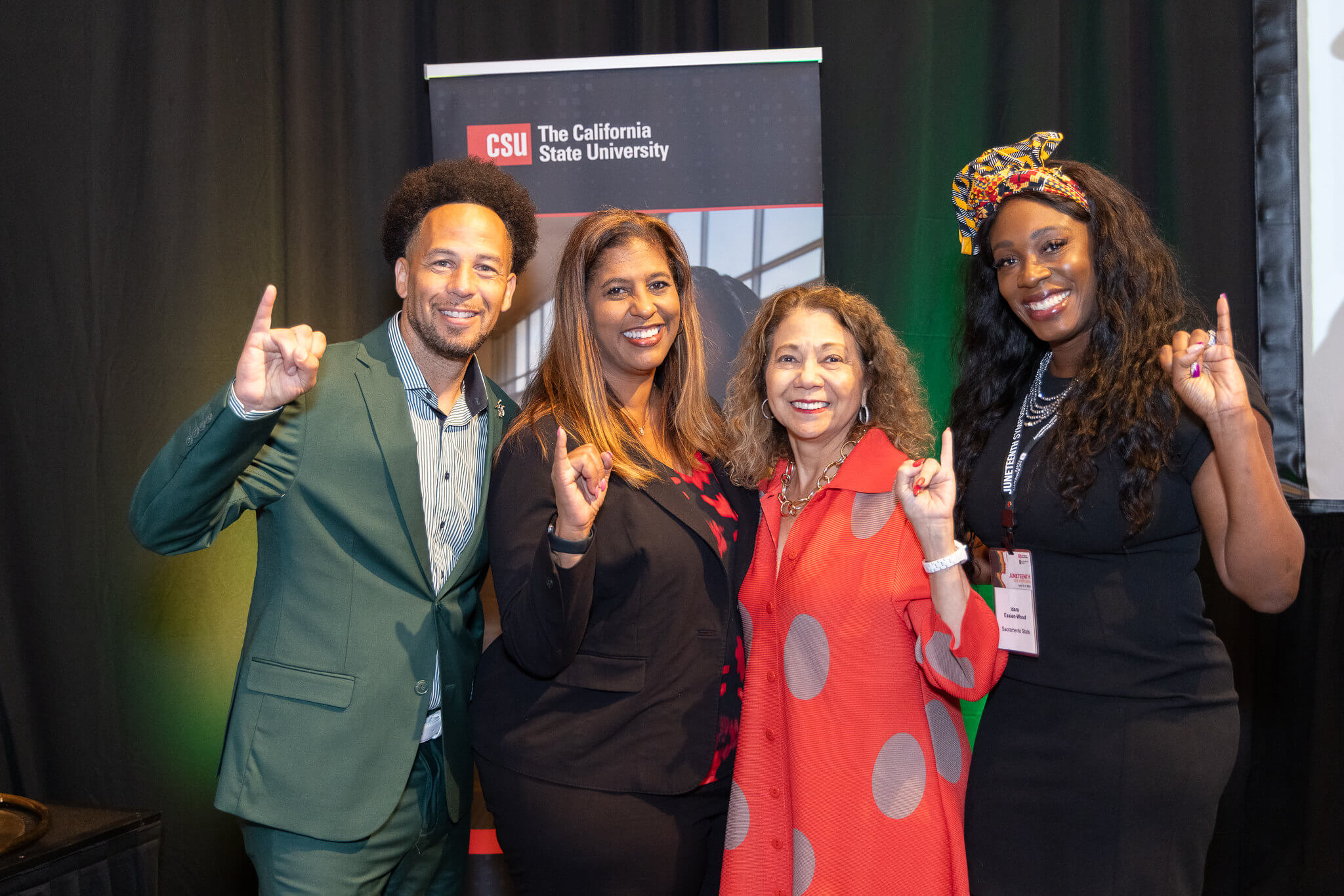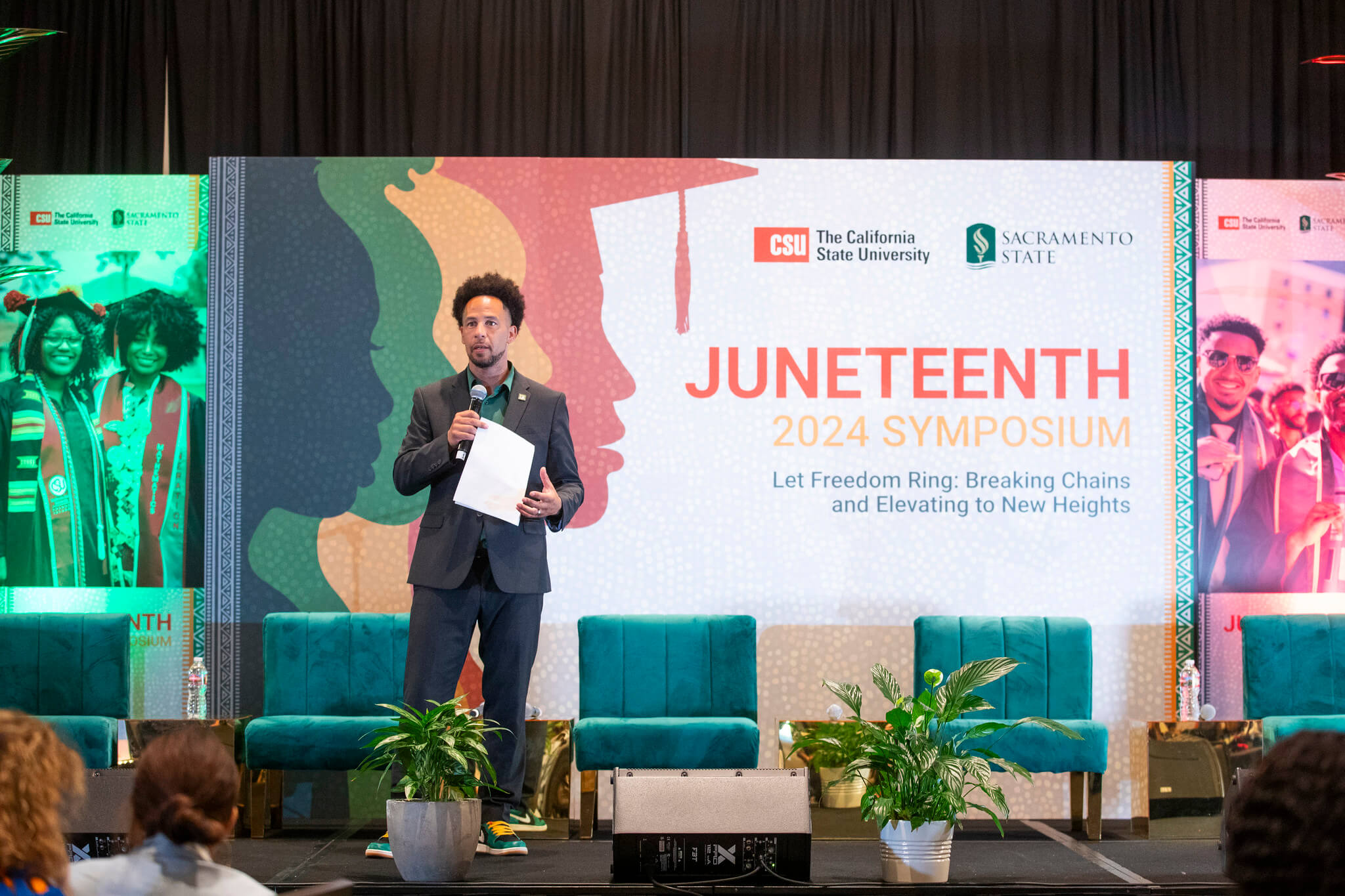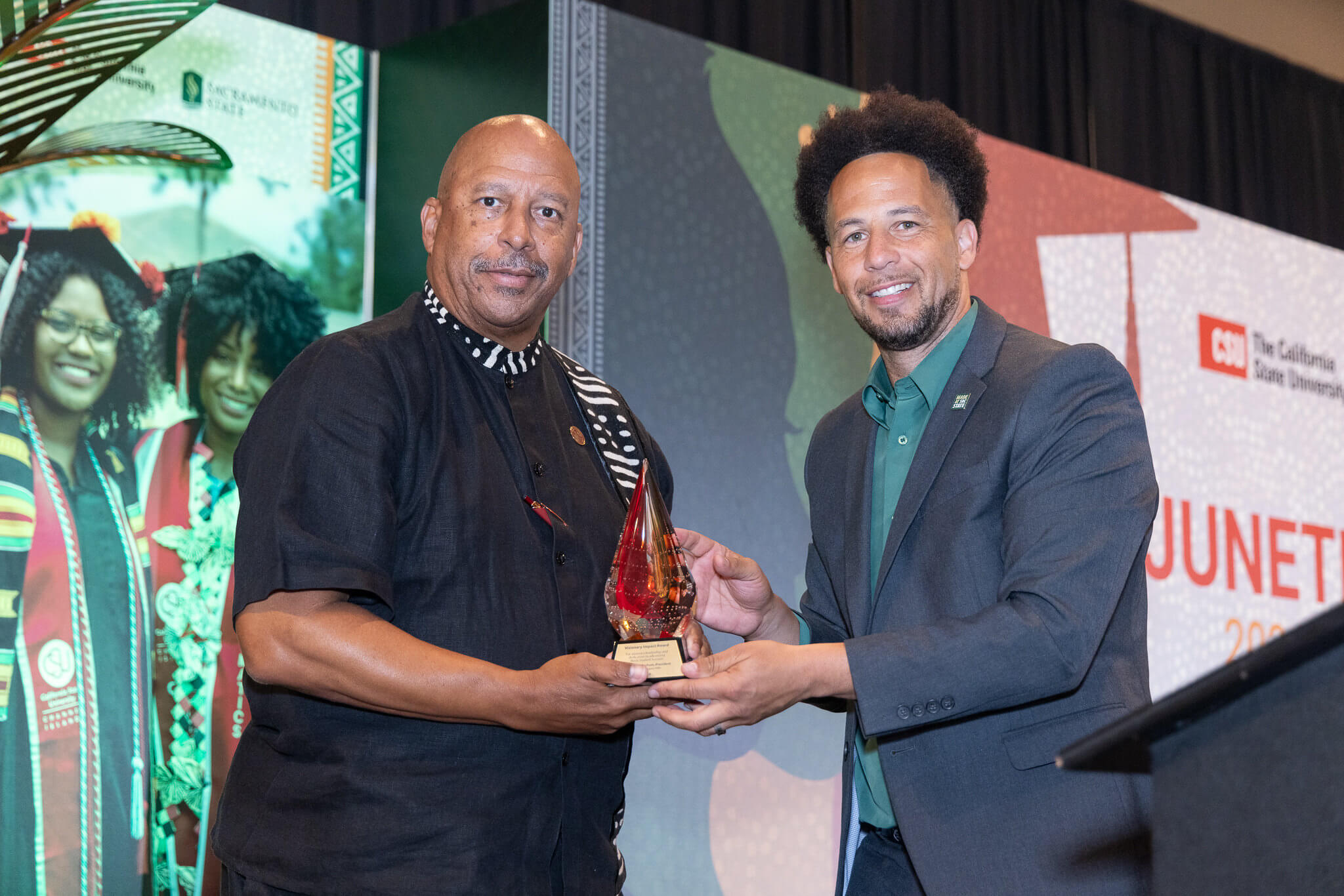Celebrating important steps forward and calling for additional action on Black student success, the California State University hosted its second biennial
Juneteenth Symposium on June 13 and 14 in partnership with Sacramento State.
More than 700 faculty, staff, administrators, students and community leaders attended the symposium, and an additional 2,000 participants tuned in virtually, to learn more about the CSU's ongoing efforts to become a national model in advancing Black student success.
The two-day symposium, titled “Let Freedom Ring: Breaking Chains and Elevating to New Heights," featured the CSU's progress since its inaugural Juneteenth Symposium in 2022. Participants heard about the antiracism work underway across the CSU's 23 campuses as well as progress on the CSU's
13 key goals for championing inclusive excellence, closing equity gaps and advancing social mobility for Black students across the CSU system.
A wide range of speakers both praised the work underway at the CSU and reinforced the need to prioritize these efforts.
“Today, while there's so much work still ahead of us, the Cal State family has undeniably taken action," CSU Chancellor Mildred García told the assembled crowd.
García noted that the CSU implemented a first-of-its-kind systemwide inventory whereby each university conducted a self-assessment and submitted proposed action items to carry out the recommendations. The CSU allocated $10 million to invest in those programs and services, with half of the dollars distributed in the spring and the second half to be distributed upon confirmation of progress.
“We are leveraging and sharing systemwide data driven practices, increasing our outlook with prospective families and communities, and we're creating spaces just like this one to continue to hold ourselves accountable and to do more and to do better," said García.
Participants also heard historical and societal insights from nationally recognized speakers including Pulitzer Prize-winning journalist and author Nikole Hannah-Jones and historian and antiracist scholar Ibram X. Kendi.
A variety of breakout sessions explored topics from university innovations to activism, equity, reparations and empowering the next generation of leaders.
(View the livestream from
June 13 and
June 14.)

From left, Sacramento State President Luke Wood, CSU Deputy Vice Chancellor of Academic and Student Affairs Dilcie Perez, CSU Chancellor Mildred García and San Diego State Professor Idara Essien-Wood hold their "Stingers Up!" (Photo courtesy Nicole Fowler/Sacramento State)
Sacramento State Recognized for Progress
As host campus, and as the nerve center for multiple efforts surrounding Black student success, Sacramento State earned a special place in the spotlight at the symposium.
Under the leadership of President Luke Wood, Sacramento State has been named the site of the CSU's first-ever
CSU Statewide Central Office for the Advancement of Black Excellence and has established the first Black Honors College in the country.
As to the importance of these programs—and to the symposium itself—Wood told participants that the country is currently in the midst of “one of the greatest coordinated attacks on civil rights in higher education in the modern era."
It is for that reason, Wood added, that the CSU must become the “North Star of the West" to let students from across the country know that there is a safe haven for them at the CSU's universities.
“We need to say to them, 'Come on over to the Cal State system. That is our promise, that is our hope, that is the vision of the CSU, and that is the vision of this symposium: to elevate, to educate and to change.'"
At the event, Sacramento State also held a special signing ceremony where Wood signed memorandums of agreement with 15 community colleges to ensure seamless pathways to the Black Honors College.

Sacramento State President Luke Wood speaks at the 2024 Juneteenth Symposium. (Photo courtesy Andrea Price/Sacramento State)
Focus on Students' Diverse Needs
The symposium's featured student speaker was Nedric Miller, who recently graduated from Sacramento State with a degree in kinesiology, clinical rehabilitation and exercise science. Growing up in a “poverty-stricken" neighborhood in L.A. and surrounded by gang life, Miller had dropped out of high school and served time in prison starting at age 18. When he got out of prison, he moved north with a family friend, completed his associate degree at Woodland College and then transferred to Sacramento State, where he found support through
Project Rebound.
Nevertheless, Miller said, coming from a background where education was not a priority, he struggled with learning how to study, relating to his peers in college and making ends meet. “I wanted to drop out so many times because I was just so frustrated," he said. “My journey through the CSU was so difficult. I know we like to be so happy and positive about our journey; but when I was on campus, I didn't feel any of that. I'm just being honest. It was very overwhelming."
Miller called for educators to understand students coming in with different perspectives. “A lot of people are not aware of what education can actually do for them. I was more willing to be shot, stabbed, go to prison or end up in a casket before I would pick up a book," he said. “While a lot of you guys don't think that's reality because you grew up in different situations and different households, for a lot of people it is. … Even though we are Black, we don't all come from the same household, we don't always come from the same community. Everybody's way of learning is always going to be different."
Wood also told of his own struggles from when he was a student at Sacramento State. Due to poor advising, he said, he took courses in his Black Studies major during his first two years without realizing that he needed to take his General Education courses first. But that mistake turned out to have a silver lining, he added: “I was in classrooms for my first two years with people who were investing in me, who cared about me, who didn't see me as a number, who saw me as a name, saw me as the community, saw me as the future. … I had enough of an ecosystem of people who were supporting me to navigate through [the next two years]."
Wood added that universities that aim to serve Black students effectively need “not just a performative commitment but a real, honest tangible commitment."

Sacramento State President Luke Wood, right, presents CSU Dominguez Hills President Thomas Parham with a Visionary Impact Award. (Photo courtesy Nicole Fowler/Sacramento State)
Inaugural Juneteenth Symposium Had Set the Stage
The CSU had initiated a focus on Black student success at its first Juneteenth Symposium in 2022, providing a platform for sharing high-impact practices, fostering community and bringing attention to the unique challenges faced by Black students, faculty and staff.
Following the 2022 symposium, the CSU formed the
Black Student Success workgroup—co-chaired by CSU Dominguez Hills President Thomas Parham and Fresno State President Saúl Jiménez-Sandoval—to develop a strategic plan that would position the CSU as a national leader in Black student success. After consulting with more than 250 Black students, faculty and staff, as well as other community partners, in June 2023 the group issued an
action plan of 13 forward-thinking recommendations for championing inclusive excellence, closing equity gaps and advancing social mobility for Black students across the university system.
Continuing its momentum and commitment to elevating Black excellence, in 2024 the CSU conducted a
systemwide inventory and asked each university to identify one to three meaningful action items to achieve within the 2024-25 academic year that would support Black student success. In April 2024, the CSU announced an
allocation of $4.6 million in one-time catalyst funding to aid in the implementation of more than 65 action items systemwide.
In May 2024, the CSU announced the launch of the CSU Statewide Central Office for the Advancement of Black Excellence to be housed at Sacramento State. The new central office will cultivate and innovate transformative practices across the system's 23 universities, as well as underserved communities.
Finally, the university announced the first-ever
Black Student Success Scholarship, sponsored by the CSU Foundation, at the 2024 Juneteenth Symposium. The scholarship awarded $5,000 to
six students across the system.
Learn more about how the CSU is advancing Black student success and elevating Black excellence.